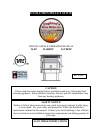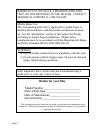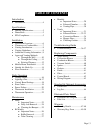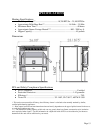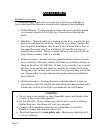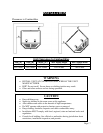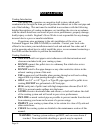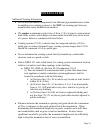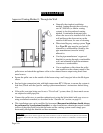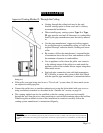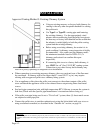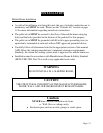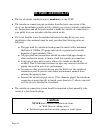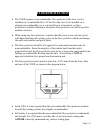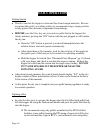
Page | 9
INSTALLATION
Additional Venting Information
• Do not mix and match components from different pipe manufacturers when
assembling your venting system (i.e. Do NOT use venting pipe from one
manufacturer and a thimble from another).
• We require a minimum vertical rise of 36 in. (3 ft.) of pipe to create natural
draft in the system, which helps evacuate smoke from the stove in the event
of a power failure or combustion blower failure.
• Venting systems 15.0 ft. or shorter may be composed entirely of 3.0 in.
pellet pipe; to reduce frictional losses, venting systems longer than 15.0 ft.
should be composed of 4.0 in. pellet pipe.
• Do not terminate the venting system directly beneath any combustible
structure such as a porch or deck.
• Follow NFPA 211 rules listed below for venting system termination location
relative to windows and other openings in the dwelling.
o NFPA 211 (2003 ed.) Section 10.4 Termination: 10.4.5
(1) The exit terminal of a mechanical draft system other than direct
vent appliances (sealed combustion system appliances) shall be
located in accordance with the following:
(a) Not less than 3 ft. (.91 m) above any forced air inlet located
within 10 ft. (3.0m).
(b) Not less than 4 ft. (1.2 m) below, 4 ft. (1.2 m) horizontally
from or 1 ft. (305 mm) above any door, window or gravity air
inlet into any building.
(c) Not less than 2 ft. (0.61 m) from an adjacent building and
not less than 7 ft. (2.1 m) above grade when located adjacent to
public walkways.
• Distance between the termination opening and grade should be a minimum
of 24 in. contingent on the grade surface below the termination. When
determining the termination height above grade, consider snow drift lines
and combustibles such as grass or leaf accumulation. In areas where
significant snowfall is possible, the termination height must be sufficiently
high to keep the termination free of snow accumulation.



